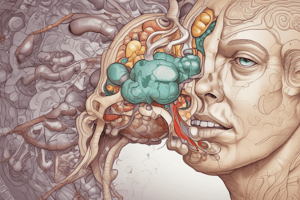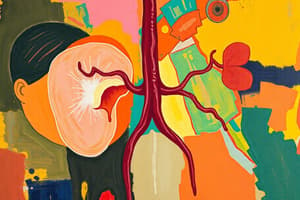Podcast
Questions and Answers
What is Traumatic Brain Injury (TBI)?
What is Traumatic Brain Injury (TBI)?
- A disease that affects the lungs
- A condition caused by internal factors
- An alteration in brain function caused by an external force (correct)
- A genetic disorder affecting brain development
When was neuroendocrine dysfunction due to TBI first described?
When was neuroendocrine dysfunction due to TBI first described?
- 2000
- 1918 (correct)
- 1985
- 1950
Approximately how many TBI cases are estimated worldwide each year?
Approximately how many TBI cases are estimated worldwide each year?
- 500,000
- 27,222,000 (correct)
- 1,000,000
- 10,000,000
What is the most common cause of direct damage to the pituitary gland after TBI?
What is the most common cause of direct damage to the pituitary gland after TBI?
What is the main function of Growth Hormone (GH)?
What is the main function of Growth Hormone (GH)?
What hormone stimulates the adrenal glands to release cortisol?
What hormone stimulates the adrenal glands to release cortisol?
In women, what role does Follicle-Stimulating Hormone (FSH) play?
In women, what role does Follicle-Stimulating Hormone (FSH) play?
Which symptom is NOT typically associated with pituitary dysfunction?
Which symptom is NOT typically associated with pituitary dysfunction?
Which of the following is a potential indicator of Post-Traumatic Hypopituitarism (PTHP)?
Which of the following is a potential indicator of Post-Traumatic Hypopituitarism (PTHP)?
What is a crucial step in managing a client with suspected Post-Traumatic Hypopituitarism (PTHP)?
What is a crucial step in managing a client with suspected Post-Traumatic Hypopituitarism (PTHP)?
Flashcards are hidden until you start studying




